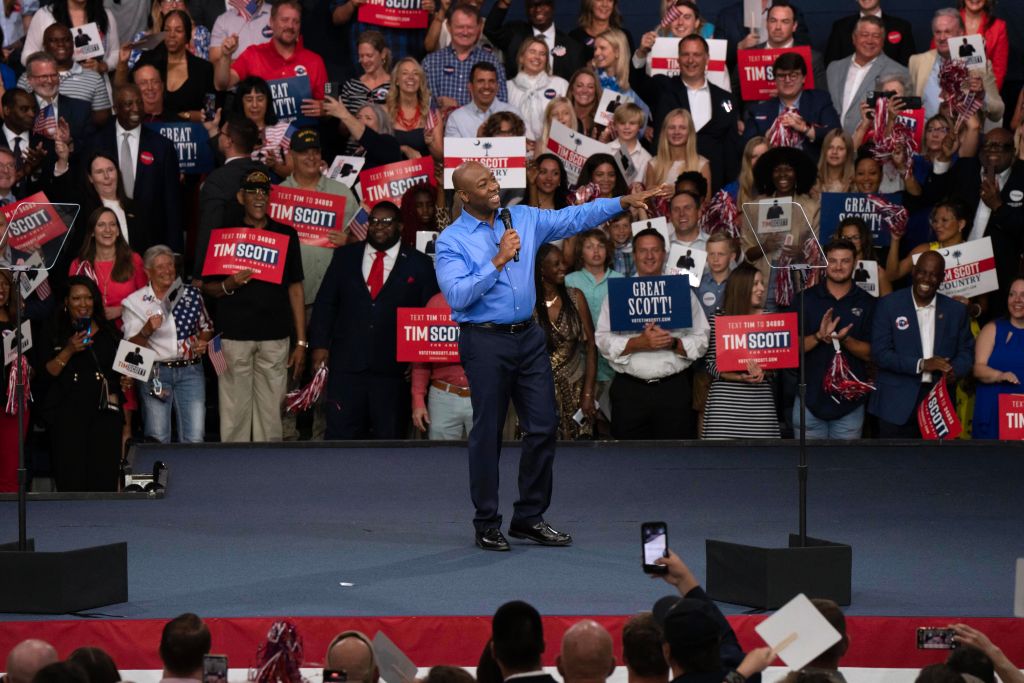Happy Monday! Rough weekend for Democratic presidential candidate Marianne Williamson, whose campaign manager announced on Twitter over the weekend that he’s quitting. (If we were less fastidious reporters, maybe we’d wonder why she didn’t foresee this.)
Up to Speed
- House Speaker Kevin McCarthy announced on Twitter Sunday that he and President Joe Biden spoke over the phone and will meet Monday to further negotiate the White House’s ongoing debt limit standoff with House Republicans, telling Fox News that it seems as though the president “wants to default more than he wants a deal.” Biden hit back at McCarthy, calling on Republicans “to move from their extreme positions because much of what they’ve proposed is simply, quite frankly, unacceptable.”
- South Carolina Sen. Tim Scott filed paperwork to run for president over the weekend and formally launched his bid with an event in his hometown of North Charleston on Monday. Senate Minority Whip John Thune, a South Dakota Republican, endorsed Scott’s presidential campaign ahead of the official launch, joining Sen. Mike Rounds—who also represents South Dakota—in backing the South Carolina senator’s bid. More on Scott’s presidential announcement in a moment.
- Biden and other world leaders pledged continued support to Ukraine during a G-7 meeting summit in Japan, giving hope to Ukrainian President Volodomyr Zelensky during a critical point in the war as Russia claims victory in the eastern city of Bakhmut. (Zelensky has refuted Russia’s victory.) “I once more shared and assured President Zelensky, together with all G-7 members and our allies and partners around the world, that we will not waver,” Biden said. “Putin will not break our resolve, as he thought he could.”
- Sen. J.D. Vance is endorsing wealthy businessman Bernie Moreno in the Ohio Republican Senate primary, Breitbart reported Monday. The two were competitors for the Senate nomination last year before Moreno dropped out and Vance, eventually endorsed by former President Donald Trump, was victorious. The winner of the 2024 Republican Senate primary will face Sen. Sherrod Brown, the incumbent Democrat, in the general election.
- Sen. Tom Carper, a Delaware Democrat, is retiring after four terms rather than seeking reelection in 2024. Carper, 76, announced his retirement Monday during a news conference. Delaware is a blue state, meaning the Democrats are likely to hold onto Carper’s seat. But the senator’s decision to step aside could spark a competitive Democratic primary. Rep. Lisa Blunt Rochester, the state’s at-large House member, is considered the favorite should she run.
Sen. Tim Scott Announces Presidential Bid
NORTH CHARLESTON, S.C.—Sen. Tim Scott announced his campaign for president Monday from his hometown, presenting himself as a consistent conservative with a positive, uplifting message. “This is the freest and fairest land. Where you and I can go as high as our character, our grit, and our talent will take us,” Scott said at the gym at Charleston Southern University, his alma mater. “I bear witness to that. I testify to that.”
It will be an uphill bid for the 57-year-old South Carolina Republican, who has financial resources but does not yet have the name recognition of other current and expected candidates in the field. Standing before a crowd of more than 1,000 and in front of a banner featuring his slogan “Faith in America,” Scott avoided direct shots at his GOP rivals—including former President Donald Trump—instead aiming his opening critique at President Joe Biden.
“Our nation, our values, and our people are strong, but our president is weak,” he said. “America is not a nation in decline. But under Joe Biden, we have become a nation in retreat.”
Scott kicked off his campaign with endorsements from two of his colleagues, Sens. John Thune and Mike Rounds, both of South Dakota. Thune delivered the opening prayer Monday morning. Well-liked in the Senate, Scott is likely to see more endorsements from other Republican senators. Cory Gardner, the former Colorado senator who chairs a pro-Scott Super PAC, told The Dispatch he has been talking regularly to his former colleagues about supporting Scott.
A number of former elected Republican officials were also in attendance, including former Tennessee Gov. Bill Haslam, who co-chairs Scott’s campaign. Two from South Carolina were also spotted: former congressman and U.S. Office of Management and Budget Director Mick Mulvaney and former congressman and Gov. Mark Sanford. When asked by The Dispatch if he was endorsing Scott for president, Sanford said he was not doing anything “formal.”
“I’m just here as a longtime friend,” Sanford said.
With around $22 million on hand, Scott begins his run for president as one of the best-funded candidates. His campaign is making a show of financial force this week with a $6 million initial buy for TV, radio, and digital ads in the two earliest states of the primary season, Iowa and New Hampshire.
And the pro-Scott super PAC, which is rebranding itself from Opportunity Matters to Trust In the Mission (or TIM) PAC, will play some role in boosting Scott’s presidential bid. A TIM PAC billboard could be spotted on the interstate in North Charleston Monday morning. Onstage Monday morning, Scott pointed out that Larry Ellison, one of the wealthiest men in the world and a primary benefactor of the PAC, was in the crowd.
Scott joins a Republican field that already includes the frontrunner, Trump, as well as another South Carolinian, former governor and former U.N. Ambassador Nikki Haley. She has been a close political ally, having appointed Scott in late 2012 to the U.S. Senate when she was governor.
With two South Carolinians in the race, the state’s all-important early primary—February 24, third on the calendar—will take on added significance. Haley was elected governor twice, while Scott has won three Senate elections, including a landslide victory in 2022. Scott’s aides point to this most recent election, in which the senator got nearly 63 percent of the vote, as a good indication of Scott’s familiarity among and popularity with the state’s Republican primary voters.
But there is also the likelihood that Scott and Haley could split the available vote in the Palmetto State and hand a plurality winner-take-all victory to another leading contender. Trump won a plurality in the state’s 2016 primary in part thanks to a large, divided field in which Sens. Marco Rubio and Ted Cruz came in a close second and third. And in 2024, Scott and Haley could be dealing with other rivals, including Florida Gov. Ron DeSantis and former Vice President Mike Pence, in addition to Trump.
Scott aides also believe his money advantage will give the relatively unknown Scott staying power in spite of his current low poll numbers. The most recent Harvard-Harris poll, for instance, had Scott at just 1 percent among registered GOP primary voters nationally, while a Winthrop University poll of the South Carolina primary found him at 7 percent among registered Republicans in the state, behind Trump at 41 percent, DeSantis at 20, and Haley at 18.
Presidential Field Getting Crowded for 2024 Republicans
Tim Scott isn’t the only Republican hopping into the presidential pool this week: Florida Gov. Ron DeSantis is expected to follow the South Carolina senator on Wednesday. And plenty of others are over by the deck chairs putting on sunscreen.
Former Vice President Mike Pence told CBS last month he’d make his 2024 decision public “well before late June.” New Hampshire Gov. Chris Sununu said recently he’d make his decision “by late June at the latest.” Former New Jersey Gov. Chris Christie’s launch will reportedly arrive “in the coming days.” North Dakota Gov. Doug Burgum is already filming ads and preparing to jump in soon too.
That kind of enthusiasm is apparently contagious: Even former energy secretary and Texas Gov. Rick Perry has publicly daydreamed about mounting a third presidential run.
Factor in the candidates already running—Donald Trump, Nikki Haley, Asa Hutchinson, Vivek Ramaswamy, Larry Elder—and you’re looking at a primary much closer to the Republican clown car of 2016 (or the Democratic clown car of 2020) than the Trump v. DeSantis head-to-head some expected.
Many of these candidates, of course, are currently pulling only a point or two—if that—in early polling. (Today’s RealClearPolitics polling average: Trump 56, DeSantis 19, Pence 5.6, Haley 4.3, Ramaswamy 3.6.)
But for the candidates, that’s a tomorrow problem: Today’s task is getting their names out there and building a fundraising base, particularly the small-dollar donors who will help them surmount likely new Republican National Committee donor thresholds to get on stage for primary debates beginning in August.
The wide field partly indicates DeSantis has lost some of his sense of inevitability as the only candidate viable enough to challenge Trump, although it’s indicative of something else too. “A wide and widening field always means one thing,” national Republican strategist Brad Todd tells The Dispatch. “The incumbent is so weak that the nomination is worth having.”
Still, there’s no question, at least at the outset, that multiple candidates piling into the campaign car helps Trump. “Frontrunners love a divided field,” said David Carney, a GOP strategist in New Hampshire.
“It’s early in the process and there is no reason for candidates not to explore their options,” said Saul Anuzis, a Republican operative and former chair of the Michigan GOP. “DeSantis has to try and become the consensus alternative to Trump, while ironically, both Trump and the other candidates want to keep the process open for as long as they can.”
A mammoth field also intensifies the spotlight—if that’s possible—on the early nominating states of Iowa, New Hampshire, and South Carolina, which will sift the electoral wheat from the chaff and likely spark a mass exodus from the race.
“Remember, it’s not how many people get in this summer,” said longtime Iowa strategist Dave Kochel. “It’s how many people get out before South Carolina, which will likely tell us who the nominee will be.”
But the rush of candidates jockeying for third place after those early nominating contests significantly complicates DeSantis’ own early strategy: going for broke in Iowa in the hope of shattering Trump’s narrative of inevitability there.
Eyes on the Trail
- Swing voters turned off by both frontrunners: Although it’s still early, focus groups can offer a good snapshot of how independent voters currently see the presidential field shaping up. Two such focus groups conducted by research firms Engagious and Sago for the Washington Post recently zeroed in on how swing-state voters view a Biden/Trump rematch in 2024. All participants voted for Trump in 2016 and Biden in 2o2o. “Nearly all of the 15 gathered swing state voters described feeling negative emotions when they saw President Biden on a television or computer screens—‘confused,’ ‘concern,’ ‘worry,’ ‘sad, ‘sorry’ and even ‘panicked.’ Every single one said they wished Biden and his old Republican foe Donald Trump were not running for reelection. Several offered dire assessments of Biden’s mental and physical capacities, calling him too old or speculating about the possibility of dementia. But as the focus group moderator steered the conversation to the possibility of a Biden rematch next year with Trump, the mood clearly shifted among these voters, who had all cast a ballot for Trump in 2016 and then Biden in 2020. Nine of the 15 said they would vote again for Biden, three said they would go back to Trump and three said they would either not vote or find a third-party candidate.”
Notable and Quotable
“We expect to be unable to pay all of our bills in early June, and possibly as soon as June 1. And I will continue to update Congress, but I certainly haven’t changed my assessment. So I think that’s a hard deadline … The odds of reaching June 15 while being able to pay all of our bills is quite low.”
—Treasury Secretary Janet Yellen on NBC’s Meet the Press, May 21, 2023









Please note that we at The Dispatch hold ourselves, our work, and our commenters to a higher standard than other places on the internet. We welcome comments that foster genuine debate or discussion—including comments critical of us or our work—but responses that include ad hominem attacks on fellow Dispatch members or are intended to stoke fear and anger may be moderated.
With your membership, you only have the ability to comment on The Morning Dispatch articles. Consider upgrading to join the conversation everywhere.